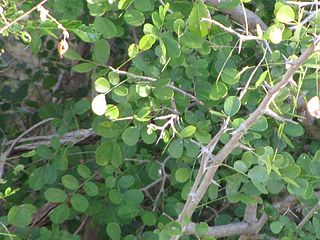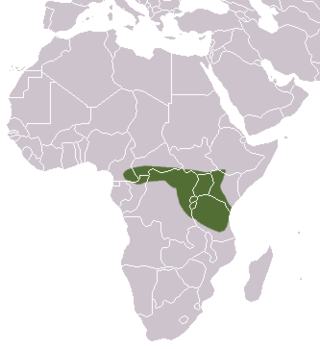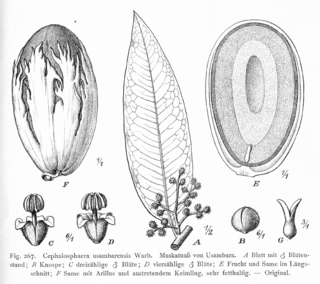
Dalbergia melanoxylon in french Granadille d'Afrique is a flowering plant in the family Fabaceae, native to seasonally dry regions of Africa from Senegal east to Eritrea and south to the north-eastern parts of South Africa. The tree is an important timber species in its native areas; it is used in the manufacture of musical instruments and fine furniture. Populations and genomic resources for genetic biodiversity maintenance in parts of its native range are threatened by overharvesting due to poor or absent conservation planning and by the species' low germination rates.

The mantled guereza, also known simply as the guereza, the eastern black-and-white colobus, or the Abyssinian black-and-white colobus, is a black-and-white colobus, a type of Old World monkey. It is native to much of west central and east Africa, including Cameroon, Equatorial Guinea, Nigeria, Ethiopia, Kenya, Tanzania, Uganda and Chad. The species consists of several subspecies that differ in appearance. It has a distinctive appearance, which is alluded to in its name; the long white fringes of hair that run along each side of its black trunk are known as a mantle. Its face is framed with white hair and it has a large white tail tuft.

The Eastern Arc Mountains are a chain of mountains found in Kenya and Tanzania. The chain runs from northeast to southwest, with the Taita Hills being in Kenya and the other ranges being in Tanzania. They are delimited on the southwest by the fault complex represented by the Makambako Gap that separates them from the Kipengere Range. To the northeast, they are delimited by more recent volcanism represented by Mount Kilimanjaro. The chain is considered a tentative World Heritage Site.

Krefft's warty frog, or Krefft's secret frog, is a species of frog in the family Brevicipitidae. It is found in the Eastern Arc Mountains in Tanzania and in southern Kenya. Its natural habitats are subtropical or tropical moist lowland forests, subtropical or tropical moist montane forests, rural gardens, and heavily degraded former forest. It is threatened by habitat loss.

The African green pigeon is a species of bird in the family Columbidae, and one of 5 green pigeon species in the Afrotropics. The species has a wide range in Sub-Saharan Africa with around 17 accepted races.

The brown-hooded kingfisher is a species of bird in the subfamily Halcyoninae, the tree kingfishers. It has a brown head and blackish and turquoise wings. It is found in Sub-Saharan Africa, living in woodland, scrubland, forest edges, and also suburban areas. The International Union for Conservation of Nature (IUCN) has assessed it as being of least concern.

The eastern violet-backed sunbird, also known as the Kenya violet-backed sunbird, is a species of bird in the family Nectariniidae. It is found in arid savanna of East Africa, ranging from Djibouti in north to Tanzania in south. It is part of the violet-backed sunbird superspecies.

The copper sunbird is a species of passerine bird in the family Nectariniidae. It is native to tropical Africa, its range extending from Senegal and Guinea in the west to South Sudan and Kenya in the east, and southwards to Angola, Zambia, Zimbabwe and Mozambique.

The white-starred robin is a species of bird in the Old World flycatcher and chat family Muscicapidae. It is also sometimes more simply called the starred robin. It is monotypic within the genus Pogonocichla. There are around twelve subspecies. The species is found in East and southern Africa. It is a forest species, occurring in montane forest in the north of its range but closer to sea level further south. This is a brightly coloured robin with a bright yellow breast and belly, a slate coloured head with spots on the eyes and throat and blueish wings.

Hildegarde's shrew is a species of mammal in the family Soricidae. It is found in Burundi, Cameroon, Central African Republic, Republic of the Congo, Democratic Republic of the Congo, Ethiopia, Kenya, Rwanda, and Tanzania. Considered by some authorities to be a subspecies of Crocidura gracilipes, it is now recognised as a separate species, with a diploid chromosome number of 2n = 52. This is one of three species of small mammal named by the British zoologist Oldfield Thomas in honour of anthropologist Hildegarde Beatrice Hinde.

Aloe ballyi is a species of flowering plant in the family Asphodelaceae, native to Kenya and Tanzania.

Cephalosphaera is a monotypic genus of flowering plants in the nutmeg family, Myristicaceae. The only species is Cephalosphaera usambarensis, a tree native to the moist evergreen forests of Kenya and Tanzania.
Toussaintia is a genus of flowering plants in the family Annonaceae. There are four species. All are native to Africa.
Uvariodendron gorgonis is a species of flowering plant in the family Annonaceae. It is native to Kenya and Tanzania. It is a tree that grows in various forests alongside Cola pseudoclavata, Lannea welwitschii, Diospyros kabuyeana, and Combretum schumannii. It is threatened by habitat loss as forests are cleared and degraded by agriculture.
Uvariodendron kirkii is a species of flowering plant in the family Annonaceae. It is found in Kenya and Tanzania.
Warburgia ugandensis, also known as Ugandan greenheart or simply greenheart tree, is a species of evergreen tree native to East Africa. Countries in which the plant species is found include Kenya, Tanzania and Uganda. The wood is resistant to insect attack and very strong. It was commonly used for the yoke pole of ox-wagons, the Disselboom. Early Indian immigrants to Kenya, working on the construction of the railway, used the leaves to flavor their curries before the chilli plant was commonly introduced. The flavor is hot and subtly different from chillies.

Trema orientale is a species of flowering tree in the hemp family, Cannabaceae. It is known by many common names, including charcoal-tree, Indian charcoal-tree, pigeon wood, Oriental trema, and in Hawaii, where it has become naturalized, gunpowder tree, or nalita. It has a near universal distribution in tropical and warm temperate parts of the Old World, with a range extending from South Africa, through the Middle East, the Indian subcontinent and southern China to Southeast Asia and Australia.
T. orientalis may refer to:
Aningeria adolfi-friederici is a species of plant in the family Sapotaceae, a tall, tropical forest tree. It is found in Burundi, the Democratic Republic of the Congo, Ethiopia, Kenya, Malawi, Rwanda, Sudan, Tanzania, Uganda, Zambia and Zimbabwe. The specific name adolfi-friedericii was given in honour of Duke Adolf Friedrich of Mecklenburg, a German explorer in Africa. Its trade name muna is taken from Gĩkũyũ mũna.













